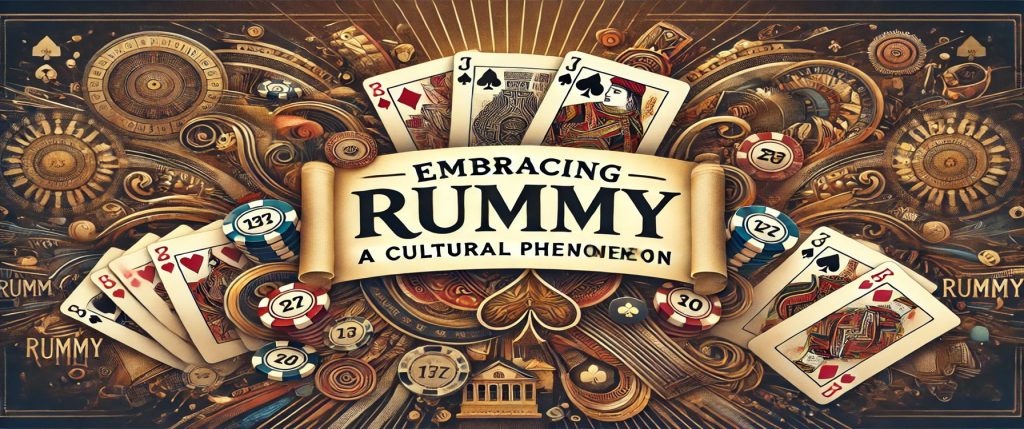
The Complete Guide to Rummy: Origins, Variations, and Cultural Impact The card game rummy has been a popular pastime for centuries, dating back to the early 1800s. Although the game’s exact origins are still somewhat unknown, it is generally accepted that Rummy developed from a number of earlier card games, such as the Chinese game “Kong,” which involved combining cards to form runs and sets. The game became well-known in the US in the 1900s, especially after Elwood T. Gin Rummy was introduced in 1909. Bakery.
Because of its straightforward rules & strategic depth, this variation of Rummy swiftly gained popularity among players. The game evolved into many regional variations as it expanded throughout the world, catering to different cultures and tastes. Rummy has evolved into a digital phenomenon in the modern era from a classic parlor game. No matter where they live, players can now play Rummy more easily than ever thanks to the development of online gaming platforms. Currently, millions of people play rummy online, taking part in both competitive tournaments and casual games.
This trend has been further stimulated by the growth of mobile applications, which enable players to enjoy Rummy while on the go. Because of this, Rummy has not only remained a popular card game but has also developed into a lively and approachable kind of entertainment that keeps drawing in new players from younger generations. Recognizing the Variations of Rummy. Instead of being a single, all-encompassing game, rummy has many variations to suit a variety of preferences and ability levels. Gin Rummy, which is usually played between two players and stresses deft card management & strategic play, is one of the most well-liked variations. In this variation, players try to minimize the number of points in their hands at the conclusion of each round while forming sets and runs.
Examining Common Variants of Rummy. Played with two decks of cards, Indian Rummy is another popular variation that frequently has more intricate melding and discarding rules. Due to its captivating gameplay, this version has amassed a devoted following and is especially well-liked in South Asia. Other noteworthy variants include Canasta, which adds tactical & cooperative elements by enabling players to form melds with their partners, and Kalooki, which adds extra rules like wild cards and particular scoring schemes. Rummy’s Development.
Because each variation adds a distinct flavor to the game, it appeals to a wide range of players. Rummy’s gameplay is further enhanced by the fact that many players like to make their own house rules or changes to already-existing games. Due in part to its versatility, rummy is still a timeless classic that changes to suit the tastes of its players. The Durable Allure of Rummy.
The game has been able to sustain its popularity over time due to its adaptability and evolution. Rummy’s ability to create unique rules and its wide variety of variations help it draw in new players and hold onto its current following. Rummy’s straightforward yet captivating mechanics appeal to players of all cultural backgrounds, which explains its widespread appeal.
Since the basic goal of the game is to form sets & runs, it is accessible to anyone who can shuffle a deck of cards regardless of language or cultural background. Rummy is now a common game played at festive occasions and family get-togethers in nations like India. Rummy is now a well-liked national pastime in India, where its popularity has resulted in the creation of multiple online platforms devoted exclusively to it. On the other hand, rummy has become popular in social contexts like game nights and informal get-togethers in Western nations.
The game’s capacity to encourage player interaction makes it a perfect option for socializing. People from various cultures frequently bring their favorite games with them when they travel or use technology, which causes gaming customs to spread. Rummy has flourished in a variety of forms worldwide as a result of this cultural exchange, proving its adaptability & allure.
The influence of rummy goes beyond the gaming table; it has been prominently featured in literature, television series, and films. Rummy is frequently used as a setting for character growth or important story points in movies. For example, intense Rummy game scenes are frequently used in Bollywood films to illustrate character rivalries or familial ties. These representations help to establish the game as a fundamental component of Indian culture in addition to highlighting its social significance.
Rummy has also been adopted by television programs as a storytelling tool. Game shows frequently use card games as challenges for competitors, & dramas might use Rummy as a means of character bonding or conflict resolution. Rummy has also been depicted in literature; writers have utilized the game as a metaphor for strategy & decisions in life. Rummy has cemented its position in popular culture as more than just a game—it is a reflection of social dynamics and human relationships—through these diverse platforms.
Fundamentally, rummy is a social game that helps players build relationships with one another. The game promotes engagement and communication whether it is played online or in person, which makes it a great option for get-togethers with loved ones. An environment of camaraderie is created by shuffling cards, chatting amiably, and sitting around a table. This can improve relationships. In many cultures, playing rummy is about more than just winning; it’s also about having fun together and making lifelong memories.
Also, by enabling players from all over the world to bond over their mutual love of the game, online platforms have increased the social component of rummy. Players can interact with people they might not otherwise meet in person while still experiencing the excitement of competition at virtual tables. Rummy has given rise to numerous online communities where players exchange tactics, advice, and personal stories. This feeling of inclusion deepens the player’s appreciation of the game & strengthens its function as a community-building tool. Rummy provides plenty of chances for players who enjoy competition to demonstrate their abilities through tournaments and contests.
These occasions can be anything from neighborhood get-togethers at community centers to major international competitions that draw elite athletes from all over the world. Tournaments frequently include organized formats that put players’ skills to the test under duress, bringing a thrilling element to the conventional gaming experience. Participants get recognition in the gaming community in addition to competing for prizes.
Because it is now available to a wider audience, competitive rummy has become even more popular due to the growth of online gaming. Players can select events that correspond to their skill level thanks to the frequent tournaments that many platforms host, which vary in difficulty & entry costs. Serious players can practice their skills against strong opponents in these tournaments, which also frequently encourage sportsmanship among competitors.
The popularity of competitive rummy keeps rising, enhancing the game’s standing as a serious sport as well as a recreational activity. Beyond its entertainment value, rummy has a number of cognitive advantages that can improve mental clarity. Because of the strategic nature of the game, players must carefully consider their moves and the possible outcomes based on what their opponents may do. Cognitive processes like memory retention, decision-making, and problem-solving are stimulated at this level of involvement. In addition to anticipating what their opponents might hold, players must recall which cards have already been played. These abilities can help them perform better in other spheres of life.
Playing card games and other mentally challenging activities can help slow down cognitive decline as people age, according to research. Through consistent challenge with games such as Rummy, players can maintain mental acuity while relishing social interactions. In addition, the game’s focus on strategy helps players cultivate insight and flexibility, which are useful in real-world scenarios as well as at the gaming table. There are a few recommendations that can improve the learning process for players who are new to Rummy or who want to get better. First & foremost, it is crucial for novices to comprehend the fundamentals; they should become acquainted with the formation of sets and runs as well as the scoring system in the variation they have selected.
Numerous online resources provide practice modes or tutorials so that beginners can learn at their own speed without feeling pressured by other users. Also, watching seasoned players can reveal important details about winning tactics & gameplay methods. More experienced players are happy to share their knowledge, so beginners shouldn’t be afraid to ask questions or seek advice. Lastly, practice is essential; playing rummy on a regular basis will help reinforce knowledge & boost self-assurance.
New players can rapidly become skilled players who take advantage of everything that Rummy has to offer by adopting these suggestions and getting fully involved in the game. Rummy is a complex game that is woven from history, culture, rivalry, and social interaction; it is more than just a simple card game, to sum up. Its transition from conventional origins to contemporary digital platforms demonstrates its versatility and timeless appeal across all age groups and cultural backgrounds. Rummy continues to foster connections between people while offering cognitive advantages that improve mental agility, whether it is played competitively in tournaments or casually among friends.
Understanding the subtleties of rummy will surely result in many hours of enjoyment and the opportunity to connect with others who share this age-old passion for those wishing to start their own journey into the game.





